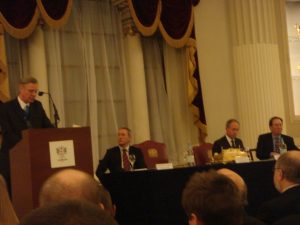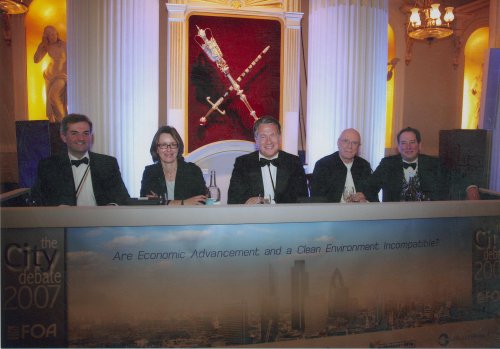After two years of hard work led by Jan-Peter Onstwedder and me, we finally launch the London Accord at Mansion House on the evening of 19 December.

Grainy but true – l to r: Rt Honourable Lord Mayor David Lewis, Rt Honourable John Sutton MP, Sir Michael Snyder, Professor Michael Mainelli
My Lord Mayor, Your Excellencies, My Lords, Secretary of State, Alderman, Sheriffs, [Councillors, Distinguished Guests,] Ladies and Gentlemen… – it is my great pleasure to have this opportunity to tell you tonight about the London Accord.
The London Accord’s theme is “cash in, carbon out”. The London Accord provides informed views about climate change investment and sets out a methodology for evaluating those investments. The London Accord began in 2005 at almost the same time as the Stern Review. Sir Nicholas said last year that “climate change is the greatest market failure the world has seen”. While I admire many aspects of the Stern Report, I beg to differ with this specific point.
Markets haven’t failed. Markets have done what markets do, set prices and transfer resources and risks. In the case of climate change, what we have is an absence of a market. Markets and investors have acted accordingly. Events in Bali last week change all that. Henceforth, society will turn greenhouse gas emissions into a property that can be capped, traded, and reduced – and we must factor these emission costs into all investment decisions.
Why does the London Accord matter? Well, for a start, the publication of the London Accord matters to us because we have been working on it for over two years, but the London Accord should matter to everyone. The comedian Jay Leno once quipped, “According to a new UN report, the global warming outlook is much worse than originally predicted. Which is pretty bad when they originally predicted it would destroy the planet.” The London Accord matters because the financial services community says, if society is prepared to pay, commerce can stop global warming.
Our future scenarios for greenhouse gas emission prices are double today’s €20 per tonne of CO2, more like €40 per tonne of CO2. In rough terms, we need to reduce the CO2 emissions per Briton from 10 tonnes to one or two tonnes. At around €40/tonne that’s about €300 per person or about €1,200 per family per year. It’s going to be quite a different world.
Private sector investment is crucial to climate change investment (86% of capital investment in energy supply must be from the private sector – UNFCCC). Much of that investment will be funded through large pension funds and asset managers who rely on analysis by the financial services sector for investment decisions. So what did the London Accord team conclude?
• Energy investment is going to become much, much riskier;
• Investors should invest now. At prices per tonne of CO2 over €30, investment portfolios can constructed that produce both attractive financial and ‘carbon returns’.
• Forestry is a big unknown – there is a need to narrow the range of credible estimates for abatement and costs of forestry projects, as well as solidify carbon offset markets for forestry.
• Efficiency gains continue to show great potential for financial and carbon returns but may need behavioural incentives such as regulation.
• Carbon capture and sequestration/storage (CCS) seems an unrealistic investment today.
Moreover, financial services leaders understand the need to collaborate or collapse. The London Accord is a great ‘open source’ research project – the largest-ever private-sector investment collaboration into climate change, representing work valued at £7million ($15million). Buy-side firms such as Universities Superannuation Scheme, Insight, and Legal & General helped sell-side firms and analysts shape the project to ensure its outcomes would be useful to investors. Observers from the EU, the International Energy Agency, the United Nations Framework Convention on Climate Change and others have been involved.
In the time available, I must turn to thanks, and there are far too many. The London Accord has truly been a cooperative effort. Jan-Peter Onstwedder and I recorded nearly 500 thanks in the CD-ROM you will receive tonight, and still we missed people. However, on such a special evening there are a few I must single out. First, I would thank my team at Z/Yen, including Ian Harris, Linda Cook, Mark Yeandle, Kevin Parker, Liz Bailey and Alexander Knapp, who put up with two years of stress. BP staff worked throughout on the London Accord, and here I would single out Tessa Marwick, Andrew Vivian, James Palmer and Sanet Phillips. Gresham College’s Lord Sutherland and Barbara Anderson helped to kick things off and generously provided facilities, including a technical seminar at Gresham College we’re having on 30 January 2008 to which all of you are welcome. Henry Thoresby and Sir Howard Davies gave us excellent support from the LSE community pulling the threads together.
The best way to thank the contributors, the important people who did all the work, is to enumerate their reports:
First we had two papers setting the context:
• Alexander Evans, Center on International Cooperation at New York University & David Steven, River Path Associates, wrote “Climate Change: the State of the Debate”, examining how climate change rose above other global issues;
• Nick Butler, Cambridge Centre for Energy Studies set out “The Forces of Change in the Energy Market”.
Then, the heavyweights analysed the investment opportunities:
• Solar Energy – Eckhard Plinke and Matthias Fawer, Bank Sarasin
• Investing in Biofuels – Conor O’Prey, ABN AMRO
• Investing in Renewable Energy – Mark Thompson, Canaccord Adams
• The Global Case for Efficiency Gains – Miroslav Durana, Tanya Monga and Hervé Prettre, Credit Suisse
• Energy Efficiency – Asari Efiong, Merrill Lynch
• Carbon Capture and Sequestration – Marc Levinson, JPMorgan Chase
• Emissions Trading – Andrew Humphrey and Luciano Diana, Morgan Stanley
• Forest Assets – Stephane Voisin and Mikael Jafs, Cheuvreux
A number of us examined the wider impacts:
• Credit Risk – Christopher Bray and Dr Richenda Connell, Barclays and Acclimatise
• Carbon Intensity – Valéry Lucas-Leclin, Société Générale
• Sustainable Investment Solutions – Alice Chapple, Vedant Walia and Will Dawson, Forum for the Future
• The Legal Issues – Lewis McDonald, Herbert Smith
• Climate Change Investment and Policy Portfolios – James Palmer
Finally, some of us considered the policy implications
• Technological Development – J Doyne Farmer & Dr Jessika Trancik, The Santa Fe Institute
• Emission Standards – Steven Davis, The Climate Conservancy
• Product-Level Standards – Hendrik Garz: WestLB
• Philanthropy – Davida Herzl, NextEarth Foundation
• Carbon Markets and Forests – Eric Bettelheim, Gregory Janetos and Jennifer Henman, Sustainable Forestry Management
• Cap-and-Trade Versus Carbon Tax – Alexander Knapp, Z/Yen, Jan-Peter Onstwedder
The full publication, The London Accord: Making Investment Work For The Climate, contains 25 reports in 780 pages.
Very early on we formed a governance team consisting of the early supporters, each of whom gave freely of their time and whom I would like to thank personally:
• Alice Chapple from Forum for the Future
• Simon Mills from the City of London Corporation
• Chris Mottershead from BP plc
• Alexander Evans from New York University’s Center on International Cooperation
Before closing, I would like to move on to three special thanks. The first is a personal and corporate thank you to the City of London Corporation. Without the Corporation’s resources this project would be a pale shadow of what it is tonight. The personal part is to thank Michael Snyder, Chairman of the Policy & Resources Committee, for putting his drive, intellect and charisma behind the London Accord so early on. People remark that it seems harder and harder for government and commerce to work together. That may be true, but when you see the City of London accomplishing so much globally, it’s hard to remember it’s just our local council.
Second, my heartfelt thanks must go to Jan-Peter Onstwedder and all the support we had from BP and, in particular, Vivienne Cox. Jan-Peter was the Project Director from last year, well before formally joining the project. Jan-Peter has diplomatic and organisational skills of which I can only dream. Jan-Peter should be giving this talk, but is, as ever, too modest. Jan-Peter applied his intellectual, social and organisational skills with the determination to show that financial services can make difference to climate change. It was a privilege to work with Jan-Peter this year.
Finally, I would like to especially thank you, my Lord Mayor. Two years ago you had the foresight and courage to lend this crazy idea your valuable support. Two years later you have the generosity and kindness to lend us your home for this magnificent event. You have been stalwart throughout and I hope that the London Accord publication is a fitting tribute to your concern, your passion and your vision of London’s financial services industry at the front of the fight against climate change. In your year in office, which has started so brilliantly, I wish you the highest success in all of your endeavours in office, from the ceremonial to the commercial to the charitable.
The London Accord demonstrates that the financial services sector understands well the future implications of climate change. A man once reproached William Shatner, who played Captain Kirk in Star Trek: “On your show, you had Russians, Chinese, Africans, and many others – why did you never have a character of my nationality?” Shatner supposedly replied, “You must understand that Star Trek is set in the future.” The London Accord is about our future and we would like to make sure that all nationalities are there, tropical, temperate or arctic; mountain top or sea-side.
Financial services is stereotyped as a selfish, self-centred industry. Over the past two years the collaboration and sharing of the London Accord has proved that stereotype wrong. The London Accord makes me proud to work in financial services. You should all be proud too.
Thank you.

